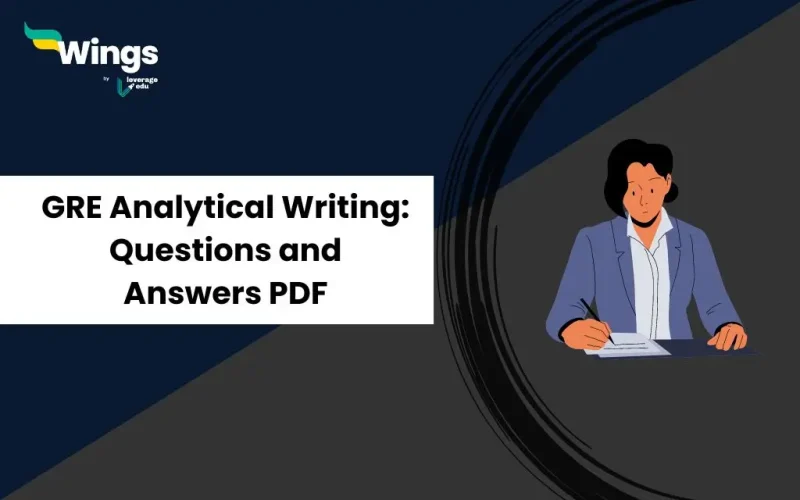GRE Analytical Writing Questions: The GRE Analytical Writing Assessment evaluates aptitude, cognitive prowess and English writing proficiency. The analytical writing section of the GRE exam is designed to gauge the calibre of students on how well they formulate arguments, evaluate arguments and express their ideas articulately or eloquently. GRE Test-takers attempting the analytical writing assessment must construe concise arguments with supporting reasons and examples. They must also be able to analyze arguments and assess their logical soundness and evidence.
That being said, test takers must be acclimated to the most frequently asked GRE analytical writing questions. This will give students a solid idea about how to tackle such questions with confidence. Read the complete blog to learn more about GRE Analytical Writing Questions.
| Name of the Test | GRE |
| Full Form | Graduate Record Examinations |
| Sections | 6 |
| Breaks | One |
| Duration | 3 hours 45 minutes (general)3 hours 40 minutes (paper-based) |
| Mode | Online (computer-based) Offline (paper-based) |
This Blog Includes:
GRE Analytical Writing Exam Pattern 2024
The GRE Analytical Writing Assessment (AWA) consists of two essays you have to write in 30 minutes each. There’s no specific format requirement, but a well-structured essay will score better. Here’s a breakdown of a common format used for the GRE AWA:
Structure:
- Introduction (1 paragraph): Briefly introduce the topic and state your thesis statement. The thesis should be a clear and concise statement that summarizes your main argument about the issue or argument presented.
- Body paragraphs (2-3 paragraphs): Each body paragraph should focus on a single reason or example that supports your thesis. Make sure each reason or example is well-explained and connected back to your thesis.
- Conclusion (1 paragraph): Briefly summarize your main points and restate your thesis differently. You can also use the conclusion to offer some final thoughts or implications of your argument.
While there’s no strict word count requirement, aiming for 500-600 words is a good target. This length allows you to develop your arguments effectively without going overboard on time.
GRE Analytical Writing Sample Questions 2024 PDF (DOWNLOAD FOR FREE)
GRE Analytical Writing Questions PDF: Here are some sample questions that you can practice to ace your GRE Analytical Writing questions. Download the free PDF from the link given below and practice the questions. Doing so will give you a solid understanding of the types of questions that can be asked, ensuring you are better equipped to tackle such questions on the day of the exam. Click on the link below to download the pdf for GRE Analytical Writing sample questions (with answers) for free!
Best Tips to Ace GRE Analytical Writing Questions
Here are some of the best tips to score better in the GRE analytical writing questions.
- Train yourself to identify the core issue from the essay prompt. Dissect the prompt, understand its nuances, and consider all perspectives before forming your stance.
- In Argument essays, pinpoint the underlying assumptions the author makes. Analyze if these assumptions are strong or weak, and how they impact the argument’s validity.
- Follow a clear structure: Introduction with thesis, Body paragraphs with reasons and examples, and Conclusion summarizing your points.
- Use relevant examples, statistics, or historical references to solidify your arguments.
- Ensure smooth transitions between ideas and paragraphs. Use transition words like “furthermore,” “however,” or “consequently” to guide the reader through your analysis.
- Strive for clear and concise language. Strong vocabulary is impressive, but convoluted sentences are not. Aim to deliver your arguments effectively without unnecessary complexity.
- Take a clear stance on the presented issue. Acknowledge opposing viewpoints but explain why yours holds more weight.
- Don’t judge the issue itself, but assess the argument’s structure. Identify weaknesses in logic, evidence, or reasoning.
- Carefully read the prompt and spend a short time planning your essay structure and arguments.
- Jot down reasons, examples, and counter-arguments. Then, start writing your essay using your plan.
- Ensure your essay flows logically. Revise for grammar, clarity, and typos.
- Do a final check for errors before submitting.
So that was all about GRE Analytical writing questions. Hope the blog has answered your queries.
Related Reads:
| Top Universities Accepting GRE Scores | Understanding GRE Registration Process | GRE Subject Test: Syllabus | Eligibility |
| 8 Common GRE Mistakes That You Must Avoid! | GRE Score Validity: 2023, Eligibility Criteria | GRE Exam Pattern, Syllabus, Test Format, & Marks |
FAQs
Ans: The ideal duration suggested by experts that is required for the preparation of the GRE Exam is between 4 to 12 weeks. That being said, one must not rush their preparation and take as much time as needed to be completely confident in their preparation.
Ans: We’ve divided the table into different colours based on whether the GRE analytical writing scores would be considered low (0.0-3.0), average (3.5-4.0), high (4.5-5.0), or excellent (5.5-6.0)
Ans: A score in the range of 4.0 to 5.0 on the GRE writing test is considered strong. Scores of 5.5 or 6.0 are outstanding. Even a slightly lower score may not significantly disadvantage your application if you can showcase your writing ability in other ways.
Build a plan with Leverage Edu‘s Leverage Live classes and our top trainers and strengthen your English score as well as your application so that you can secure your spot in your dream college. Reach out to Leverage Edu on 1800572000 and schedule a free session today.


 One app for all your study abroad needs
One app for all your study abroad needs












 60,000+ students trusted us with their dreams. Take the first step today!
60,000+ students trusted us with their dreams. Take the first step today!